Teknolust: Four Tildas is better than One
 Monday, July 10, 2023 at 9:00AM
Monday, July 10, 2023 at 9:00AM 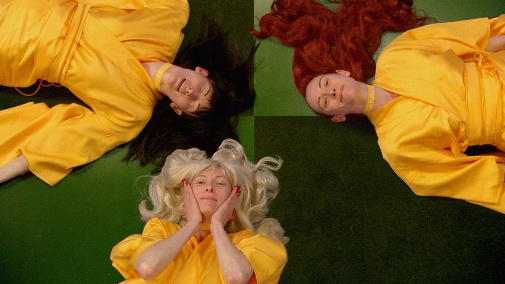
We live in a time when what was once conjecture is becoming a perilous reality, dreams of advanced tech crashing into the nightmare of actual artificial intelligence. Facing these newborn terrors of our digital age, the Criterion Channel looks back. Spanning fifty years of film history, a collection of 17 titles investigates how cineastes have approached the topic of AI, from decades when it was just narrative device or metaphor, to our present state of sci-fi as a direct response to concrete real-world anxieties.
This cinematic tasting menu of techno-cinema offers many gustative possibilities, though none more surprising than Lynn Hershman-Leeson's Teknolust. Criminally underseen upon its 2002/2003 release, the unorthodox comedy posits a scenario where Tilda Swinton plays four roles, mad scientist Rosetta Stone and her three cybernetic creations cum clones – Ruby, Marinne, and Olive…
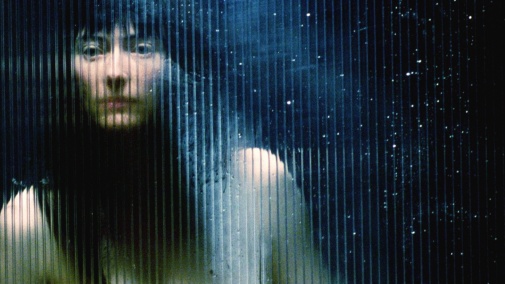
Lynn Hershman Leeson's career as a multi-media artist started in the 60s vanguards, often working within themes related to sexuality and the body, appealing to technological notions and sci-fi concepts. The cyborg was an early point of interest, later correlated to her exploration of alter-egos, including that of an AI interactive sculpture christened CybeRoberta. Perusing her vast catalog of mad imaginings, one finds many different devices and forms – sculpture in material terms or virtual construction, installations, photography, engines, and, eventually, video falling into film.
Such paths would lead Leeson to one of contemporary cinema's most alien figures, someone who seems to tread lines between realities - Tilda Swinton. She starred in Conceiving Ada, exploring the pioneer of computer language Ada Lovelace, daughter to Lord Byron and mathematician sui generis, so often forgotten in the annals of history. From that collaboration, other ideas grew. Some came to life in galleries. Others reached the silver screen, like Teknolust, whose concepts and characters would live beyond its narrative confines, proliferating as interactive installations down the road.
In fairness, these words could lead one to pre-judge Teknolust as an insular piece, untethered from expectation to the point of anti-viewer hostility, some hyper-serious musing that demands academic dissertation rather than engagement. Such panics couldn't be farther from the truth. This is a bizarre object, no doubt about it, but one that's eager to invite the audience into its mania. Consider the opening salvos, when a scarlet-clad raven-haired Tilda Swinton finishes her third sexual encounter with an unspecified stranger. Though he wants more, her business is done, a condom full of semen secured in the bag.
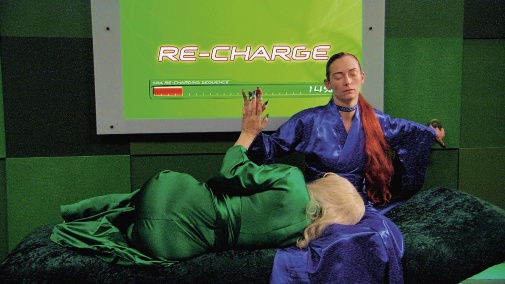
Arriving home, our lady Ruby communicates with the microwave while she makes tisane infusion out of the man's spent liquids. She travels down to an underground section of the abode and meets two more Tildas waiting for their sustenance. All wear cheap poly-satin yukata-like robes, crowned with shake-and-go wigs of different hues and a choker with their name on it as if they were pets. Marinne is red-haired and dons blue, Olive a shock white blonde with a preference for green. Nothing looks real in their secret domesticity, for they aren't real in the human way. After all, homo sapiens sapiens don't usually need to plug their nails into walls to charge batteries.
Part clones, part automaton, they require a steady supply of Y chromosomes to stay alive, consumed by drink and injection – though not the fun kind. Still, one can hardly look at these color-coded triplets and surmise any shade of humorlessness. Their mother-sister is a geneticist called Rosetta Stone, whose name is as much a joke as a ready label in the manner of her sister-daughter's tags. Essentially, she is a parody of Leeson in a film akin to a self-portrait fueled by horniness so powerful it will change the world, a male universe shapeshifted through out-of-this-world female desire.
If you should try to make sense of this nonsense, you'll surely collide with a wall of frustration at lightspeed. Though playing with profound ideas about gender and technology, sex fucked sideways by a bodily autonomy imperative, the disintegration of identity as humans interact with machines of their creation, Teknolust never takes itself too seriously. It can also be deadly earnest, even when it laughs in the mirror. Be it expressed in ludicrous dialogue or incongruent green-screen dance breaks, it's a fun time. You certainly can't accuse a movie where Karen Black plays a trans private eye called Dirty Dick of being too self-important for its own good.
And yet, to dismiss Teknolust as flat lark would be wrong too, especially when it comes to Tilda Swinton's polychromatic performance, four distinct germinations of the same genetic material. As Rosetta Stone, the British thespian punctures the plot with a sting of personhood. The mousy costume and curly wig suggest another cartoon, but there's real fragility in her characterization, the ghost of youthful loss juxtaposed with a scientist losing herself into her work, downloading who she is into what she isn't. The spark of wonderment over the triplets is immense, but so is Rosetta's bafflement at their independent developments.
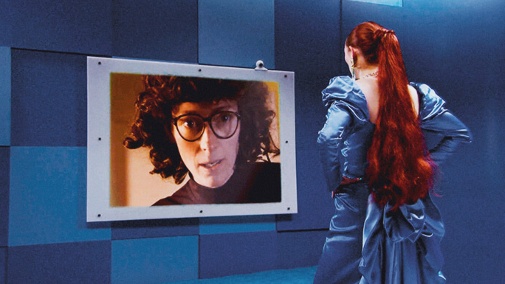
Watching Swinton work out four-way dialogues between her multiplied visages is a riot and a marvel. Though, for how strangely human Rosetta seems, it's the contrasting inhumanity of the clones that most fascinates. Ruby is our po-faced protagonist, a deadpan diva moving with pragmatism through the night, a sex vampire crossbred with a fish out of water whose expressions vary between vacant automation and honest spontaneity. She's the caregiver of the three, the one who goes out for prey and takes care of her sisters. She's also the triplet who reaches out into the human world beyond hunger, discovering individuality in the process.
Olive is the silliest sister, bubbly to a fault, and something of a peacekeeper who wields somnambulistic cheer as her primary tool. Mostly styled with an eye hidden by bangs, one feels a whisper of adolescence in her demeanor. However, if there's a stroppy teen in the bunch, it's got to be Marinne, distinguished by encrypted speech and an unquenched craving for freedom. Together, they are a chimera like no other in film, representing both the terrorizing possibility of technology unbound and the hope that comes when gazing at the wonderment of individual personhood, regardless of how it was produced.
Though it might seem wild to state it, Teknolust represents one of Tilda Swinton's most accomplished performances, inching sci-fi toward Brechtian circus even as she embodies a distorted mirror reflection of her director. Like Orlando and the Mirando twins, the vampire Eve or Constantine's Gabriel, Guadagnino's women and Hogg's self-regard, the Teknolust quartet is so perfect for her that it's hard to envision any other actor tackling it. If you're a fan, you've got to sink your teeth into the lunacy dessert Lynn Hershman-Leeson fashioned out of AI dreams, fears, love blossomed in hard-drive hearts, orgasms galore.
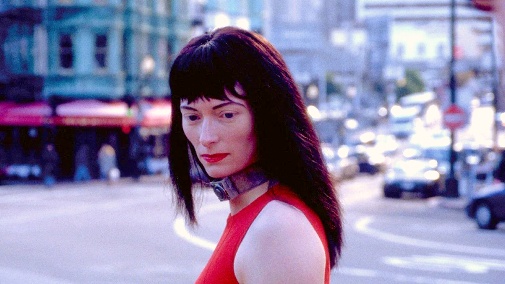
Beyond the Criterion Channel, Teknolust is also currently streaming on MUBI. Alternatively, you can rent it on Amazon, Google Play, Youtube, VUDU, and Apple TV.
 Criterion Channel,
Criterion Channel,  Teknolust,
Teknolust,  Tilda Swinton,
Tilda Swinton,  sci-fi,
sci-fi,  streaming
streaming 


Reader Comments (2)
I saw this on Starz! back in 2003/2004 and thought it was a fun and interesting film. Plus, seeing Tilda Swinton play 4 versions of herself is a fucking hoot. I enjoyed this as it is definitely underrated.
This was always on cable when I was a kid and I was convinced it was *another* kind of movie back then. I finally caught up with it a few years ago and was really delighted by it. I also noticed what I thought to be a striking similarity to Spike Jonze’s “Her.” After some googling, I stumbled across an interview with the director where she basically claims to have directly inspired Jonze’s film. Go figure.